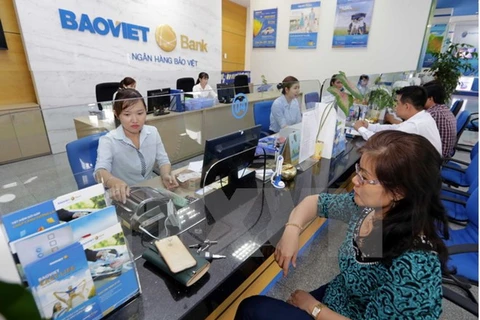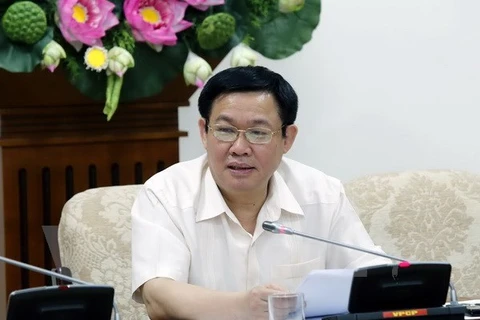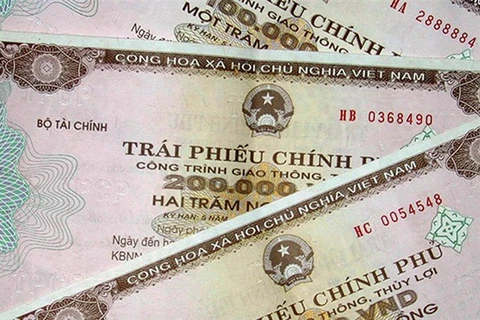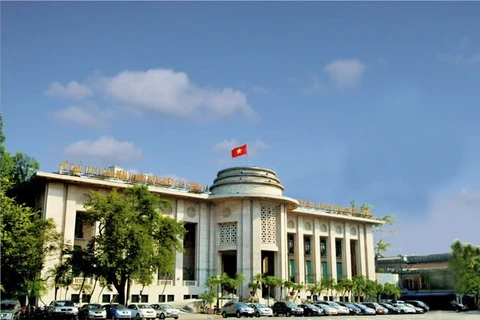Hanoi (VNA) - Prime Minister Nguyen Xuan Phuc has urged the State Bank of Vietnam (SBV) to take more comprehensive and bold measures to boost credit growth and reduce interest rates.
The message was communicated to the SBV on July 18 in Hanoi by a working group led by Minister, Chairman of the Government Office Mai Tien Dung, to push the central bank to help achieve the 6.7 percent economic growth targeted for this year.
Besides meeting the credit growth target of 18 percent in 2017, the PM required the SBV to better direct loans flowing into production, business and infrastructure to support firms, Dung said.
Dung said the PM pointed out that though the country had 110,000 newly established firms in 2016, and nearly 60,000 in the first half of this year, the number of firms that closed or stopped operations during these periods was high, because of difficulties in credit access, land and policies.
Interest rate cuts would help firms a lot, Dung said, estimating that with outstanding loans of the entire banking system standing at around 5 quadrillion VND (219.3 billion USD), a rate cut of 1 percentage point would help firms save 50 trillion VND; the State budget earn another 2 trillion VND from corporate income tax; and the GDP rise by 0.25 percent.
With domestic public debts of roughly 1 quadrillion VND, the same rate cut would also contribute to saving 10 trillion VND of the State budget, Dung added.
However, he said, to cut rates, the SBV must first focus on settling non-performing loans (NPLs).
“Interest rate cannot be cut unless NPLs are settled,” he said and ordered the SBV to issue guidelines soon to make it easier for credit institutions to sell secure loans and assets, based on the new resolution passed recently by the National Assembly on settling NPLs.
The message was communicated to the SBV on July 18 in Hanoi by a working group led by Minister, Chairman of the Government Office Mai Tien Dung, to push the central bank to help achieve the 6.7 percent economic growth targeted for this year.
Besides meeting the credit growth target of 18 percent in 2017, the PM required the SBV to better direct loans flowing into production, business and infrastructure to support firms, Dung said.
Dung said the PM pointed out that though the country had 110,000 newly established firms in 2016, and nearly 60,000 in the first half of this year, the number of firms that closed or stopped operations during these periods was high, because of difficulties in credit access, land and policies.
Interest rate cuts would help firms a lot, Dung said, estimating that with outstanding loans of the entire banking system standing at around 5 quadrillion VND (219.3 billion USD), a rate cut of 1 percentage point would help firms save 50 trillion VND; the State budget earn another 2 trillion VND from corporate income tax; and the GDP rise by 0.25 percent.
With domestic public debts of roughly 1 quadrillion VND, the same rate cut would also contribute to saving 10 trillion VND of the State budget, Dung added.
However, he said, to cut rates, the SBV must first focus on settling non-performing loans (NPLs).
“Interest rate cannot be cut unless NPLs are settled,” he said and ordered the SBV to issue guidelines soon to make it easier for credit institutions to sell secure loans and assets, based on the new resolution passed recently by the National Assembly on settling NPLs.
[SBV may consider lifting credit growth targets: Analysts]
The PM has also asked the central bank to study and determine how to mobilise foreign currency from local people, and said the current zero percent interest rate policy for US dollar deposits would obviously not attract dollar holders to make bank deposits.“Though the SBV’s aim is to curb dollarisation of the local economy, it must think about other measures to mobilise this idle capital as we still have to buy international bonds at interest rate of more than 4 percent,” Dung said.
He said Phuc had also instructed the SBV to better implement regulations in Circular 36/2014, which are aimed at settling cross-ownership among commercial banks. Though the issue is more under control since the circular took effect in 2015, there remain cross-ownership among banks. For example, Vietcombank still holds 7.16 percent of the charter capitals of Military Bank, 8.19 percent of Eximbank, 5.07 percent of SaigonBank and 4.3 percent of OCB’s charter capital, lower ratio compared to 9.8 percent, 8.2 percent, 5.26 percent and 4.6 percent in 2014, respectively.
Finally, the SBV must also strengthen security for internet banking services. “We are encouraging local people to use other kinds of payment instead of cash in their daily lives, so security is very important. Otherwise, it will affect people’s trust on the banking system,” Dung said.-VNA
VNA
























